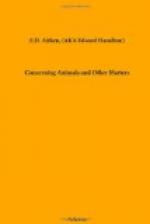Mr. Aitken was born at Satara in the Bombay Presidency on August 16, 1851. His father was the Rev. James Aitken, missionary of the Free Church of Scotland. His mother was a sister of the Rev. Daniel Edward, missionary to the Jews at Breslau for some fifty years. He was educated by his father in India, and one can well realise the sort of education he got from such parents from the many allusions to the Bible and its old Testament characters that one constantly finds used with such effect in his books. His farther education was obtained at Bombay and Poona. He passed M.A. and B.A. of Bombay University first on the list, and won the Homejee Cursetjee prize with a poem in 1880. From 1870 to 1876 he was Latin Reader in the Deccan College at Poona, which accounts for the extensive acquaintance with the Latin classics so charmingly manifest in his writings. That he was well grounded in Greek is also certain, for the writer, while living in a chummery with him in Bombay in 1902, saw him constantly reading the Greek Testament in the mornings without the aid of a dictionary.
He entered the Customs and Salt Department of the Government of Bombay in April 1876, and served in Kharaghoda (the Dustypore of the Tribes), Uran, North Kanara and Goa Frontier, Ratnagiri, and Bombay itself. In May, 1903, he was appointed Chief Collector of Customs and Salt Revenue at Karachi, and in November, 1905, was made Superintendent in charge of the District Gazetteer of Sind. He retired from the service in August 1906.
He married in 1883 the daughter of the Rev. J. Chalmers Blake, and left a family of two sons and three daughters.
In 1902 he was deputed, on special duty, to investigate the prevalence of malaria at the Customs stations along the frontier of Goa, and to devise means for removing the Salt Peons at these posts, from the neighbourhood of the anopheles mosquito, by that time recognised as the cause of the deadly malaria, which made service on that frontier dreaded by all.
It was during this expedition that he discovered a new species of anopheline mosquito, which after identification by Major James, I.M.S., was named after him Anopheles aitkeni. During his long service there are to be found in the Annual Reports of the Customs Department frequent mention of Mr. Aitken’s good work, but it is doubtful whether the Government ever fully realised what an able literary man they had in their service, wasting his talent in the Salt Department. On two occasions only did congenial work come to him in the course of his public duty—namely, when he was sent to study, from the naturalist’s point of view, the malarial conditions prevailing on the frontier of Goa; and when during the last two years of his service he was put in literary charge of The Sind Gazetteer. In this book one can see the light and graceful literary touch of Eha frequently cropping up amidst the dry bones of public health and commercial statistics, and the book is enlivened by innumerable witty and philosophic touches appearing in the most unlikely places, such as he alone could enliven a dull subject with. Would that all Government gazetteers were similarly adorned! But there are not many “Ehas” in Government employ in India.




